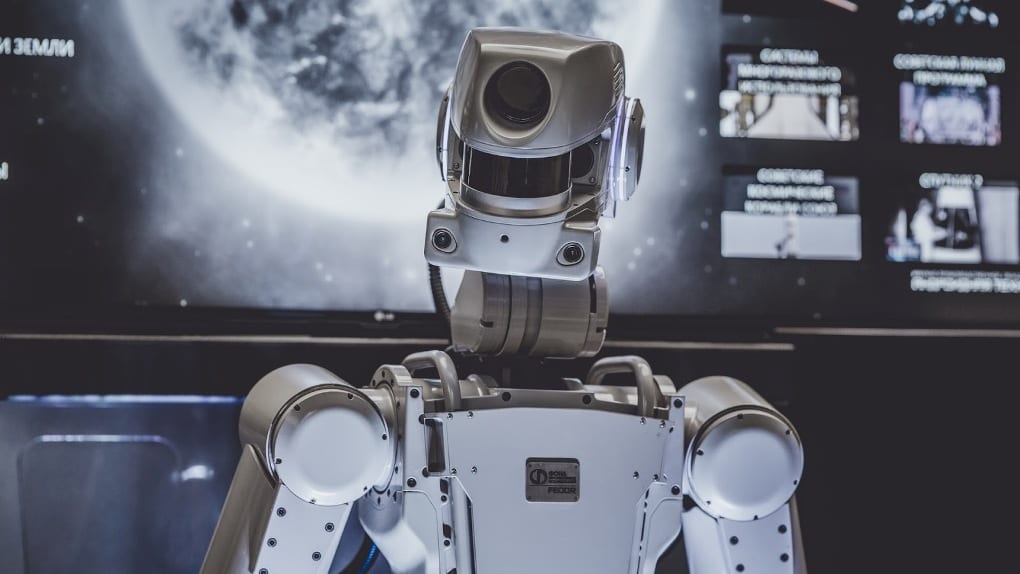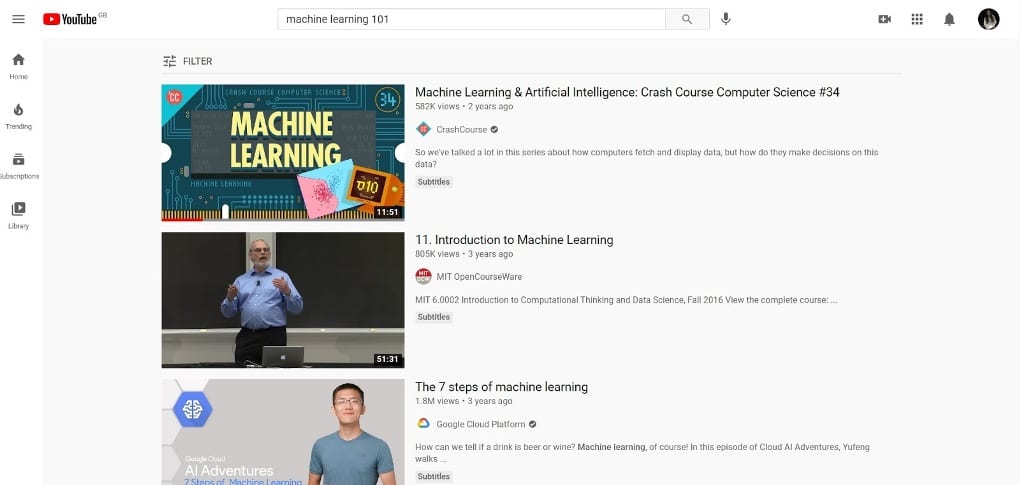Machine learning is becoming more and more similar to the way humans learn. Although we still don’t have artificial intelligence that is advanced enough to think abstractly, feel emotions, or be creative, machines are now able to learn singular tasks.
Some examples of how ML is used today include image recognition, speech recognition, Google maps, Google’s algorithm, online ad recommendations, health care machines, and self-driving cars.
If you’re researching how to learn machine learning, read on for a full breakdown of the field, and the best courses and resources to learn machine learning.
What Is Machine Learning?
Machine learning, or ML, combines computer science and statistics to enable a device to learn a task rather than being programmed to do so. Machine learning algorithms use data to make decisions and predictions.
ML training is all about determining how we can use technology to help us. As classification algorithms get stronger, it is becoming easier for humans to compare data and gain valuable insight.
For example, maybe you are researching ants and want to distinguish between different species of ants. So, you can provide the machine with training data on the mass and length of the ants you have already recorded, and as the machine learns, it will be able to predict the category of any new species you find.
Furthermore, as technology progresses and machine learning improves, artificial intelligence will get stronger. Machines will become more capable of assessing situations, accumulating data, and thinking cognitively to make decisions.
What Is Machine Learning Used For?
What if humans could train machines to learn from their past as we do, but at a much faster speed? Modern machine learning is based on algorithms, which are a series of calculations carried out by a computer. Below are some examples of machine learning:
- Facebook. When you post a picture on social media, you may see a facial recognition box appear, suggesting friends for you to tag in the photo. This is a facial recognition algorithm created by “Deepface” researchers at Facebook. The job of these researchers is to discover ways to add deep learning vs machine learning to the Facebook algorithm to make it easy for you to tag people in photos.
- Uber. Uber uses machine learning to create a better user experience within its app. ML is used to estimate arrival times and predict where you may want to go based on your current location.
- Google Translate. Using hundreds of thousands of translated texts, Google translate is helping people break through language barriers. Although the algorithm is not always entirely accurate, it is an extremely helpful tool for travelers.
- KUKA. This German manufacturer is using machine learning in its robotic arms made for factory automation. These innovative arms can grab and move objects thanks to data analytics and machine learning.
- Amazon Ads. The use of algorithms means that when you click on an item on Amazon but decide not to purchase it, you will see other advertisements on different websites for similar items. Similarly, ML will also recommend products or services based on data from your search history.
Types of Machine Learning Careers
Are you wondering what potential careers you can pursue after taking a machine learning class? In today’s tech-centered world, you will have plenty of options.
Machine Learning Researcher
For those interested in advancing our knowledge of ML, research might be an ideal role. Researchers develop theories and test them through trial and error to create new algorithms and data sets that will further machines’ capabilities.
Machine Learning Engineer
Engineers integrate machine learning systems to create an end-to-end machine experience. They create programs and algorithms that make it possible for machines to take actions without being directed to by humans. Foundational knowledge in software engineering is a requirement for a role like an ML engineer.
Machine Learning Scientist
ML scientists focus on modeling, measuring, and debugging. They build models and create training data, based on the learning algorithms that are used for certain tasks. They also have knowledge of programming languages such as Python.
Data Scientist
Data science uses scientific methods and algorithms to extract knowledge from data. Data science is related to machine learning, data mining, and big data.
Machine Learning Architect
The architect creates machine learning solutions to real-world problems. The processes involved in ML architecture are data acquisition, data processing, model engineering, execution, and the deployment of a creation.
Learning Machine Learning
Lots of people think that you need to go to college to get a bachelor’s or master’s degree in computer science to become a machine learning expert.
However, there are many ways to build up your ML skills, such as attending a coding bootcamp, taking specific machine learning classes, and creating your own machine learning projects to fill your portfolio.
Employers may advertise a role as requiring a master’s degree, but they usually value experience over a degree, so don’t be discouraged.
How Long Does It Take to Learn Machine Learning?
This depends on the individual and their ability to learn the related skills, combined with your preferred learning path. It is impossible to put a time frame on learning ML as it involves an understanding of mathematics, coding, data science, and a separate set of ML skills.
However, if you already know how to code and have strong mathematics knowledge, you can potentially complete a course in ML in as little as two days.
How to Learn Machine Learning: Step-by-Step
Are you unsure of how to begin your machine learning journey? Allow us to break it down for you in a step-by-step guide below.
- Learn Calculus. The first step is to learn multivariable calculus. This is usually done either in your second year of undergraduate studies or through an accredited certification course.
- Learn Linear Algebra. Although these first two are not 100 percent necessary, they will provide you a good foundation for the rest of your career. Taking a linear algebra course at college or through an online certification course will be great for your resume.
- Learn Coding. To land a job in ML, it is essential to learn to code. This includes learning languages like HTML, Javascript, C++, PHP, and most importantly Python. Detailed knowledge of programming languages will prepare you to acquire the necessary certifications and you will be able to effectively create machine learning models.
- Machine Learning Training. Next, you should get some training in machine learning. In the course, you can expect to be taught supervised learning, unsupervised learning, semi-supervised learning, reinforcement learning, deep learning, decision trees, support vector machines, and linear regression.
- Create Personal Projects. Now, you can begin a personal project in machine learning and data science. You can start by crafting simple neural networks, and later move on to deep neural networks. Pursue the type of problems that you want to solve and have fun working on projects that will also boost your skills.
The Best Machine Learning Courses and Training

There are many ways to learn ML, including in-person classes, online courses, and free learning. Browse our list below to discover the best classes for beginner, intermediate, and advanced ML students.
In-Person Machine Learning Classes
Below are a few in-person courses and programs students may be interested in. Keep in mind that due to the COVID-19 pandemic, fewer courses are offering this type of learning experience.
Python and Machine Learning Bootcamp in New York City
- Provider: General Assembly, NYC
- Time: 2 Days
- Prerequisites: None
- Price: $375
General Assembly provides many full-time and part-time classes exploring all kinds of tech skills and in many cities across the US. Students interested in ML may want to learn an individual programming language online or attend a Python and Machine Learning Bootcamp at one of General Assembly’s campuses, such as in NYC.
Professional Certificate Program in Machine Learning and Artificial Intelligence
- Provider: MIT, Cambridge, MA
- Time: 16 Days
- Prerequisites: For professionals with a bachelor’s degree in an area such as computer science, statistics, physics, or electrical engineering and with at least three years of experience
- Price: Application fee $325+ (varies)
Through this professional MIT certificate program, students will learn to develop effective AI systems, use AI in the workplace, and help people and organizations advance cognitive technology.
Online Machine Learning Courses
These online machine learning courses are great intermediate courses for those with prior programming knowledge. Below are some great online study options.
MicroMasters Program in Artificial Intelligence
- Provider: edX
- Time: 1 Year
- Prerequisites: Bachelor’s degree in computer science or mathematics
- Price: $988.34
This one-year program provided by edX via Colombia University is excellent for anyone who wants a cheaper option for a master’s degree. The course will cover AI, machine learning, robotics, animation, and CGI motion.
Deep Learning Specialization
- Provider: Coursera
- Time: 4 Months
- Prerequisites: Experience in Python and mathematics
- Price: Free
In these Coursera courses, you will explore deep learning, lead machine learning projects, convolutional networks, RNNs, neural networks, LSTM, Adam, Dropout, and BatchNorm.

"Career Karma entered my life when I needed it most and quickly helped me match with a bootcamp. Two months after graduating, I found my dream job that aligned with my values and goals in life!"
Venus, Software Engineer at Rockbot
Free Machine Learning Courses
Below are a few free ML courses if you want to gain background knowledge without investing any money. These are all also offered online, and are great for beginner and intermediate level.
Machine Learning with Python Certification
- Provider: freeCodeCamp
- Time: 300 Hours
- Prerequisites: None
- Price: Free
The freeCodeCamp website offers incredibly detailed 300-hour courses on machine learning, data analysis, and scientific computing with Python. This is a great resource for free coding training, guides, and certificates.
Machine Learning Course by Stanford University
- Provider: Coursera
- Time: 60 Hours
- Prerequisites: None
- Price: Free
In this 60-hour Coursera class offered by Stanford University, students will get an introduction to machine learning and will practice linear regressions and linear algebra. They will also take an Octave/Matlab tutorial and learn about neural networks. With a review score of 4.9 out of 5, this course is certain to provide ML students with a great foundation for their careers.
Introduction to Machine Learning for Coders
- Provider: Fast.ai
- Time: 12 Weeks
- Prerequisites: One year of coding experience, high school math
- Price: Free
This incredible course by fast.ai contains lessons recorded at the University of San Francisco for their master’s degree program in data science. This is a great free course for anyone who can’t afford a master’s price but want to gain more essential ML knowledge. You will learn about random forests, machine learning models, create models from scratch, data preparation, model validation, and how to build data products.
Machine Learning Books
Another way to expand your ML knowledge is with books, e-books, and audiobooks. The list below features all of Career Karma’s top book picks.
Building Intelligent Systems, Geoff Hulten
Learn how to build intelligent systems and how machine learning works. You will get a better understanding of how to apply software engineering skills, data science, machine learning, management, and program management to produce working systems.
Introduction to Machine Learning with Python: A Guide for Data Scientist, Andreas C Müller & Sarah Guido
This is a beginner’s guide to the applications of machine learning. This book will show you how to represent data processed by machine learning, including advanced methods for model evaluation and parameter tuning. You will also learn about chaining models and text data.
Machine Learning: An Applied Mathematics Introduction, Paul Wilmott
This book is a self-contained introduction to machine learning. All that the reader needs is an understanding of matrix algebra and calculus basics. The book covers the essential mathematics behind all of the most important ML techniques.
Hands-On Machine Learning with Scikit-Learn, Keras, and TensorFlow: Concepts, Tools, and Techniques to Build Intelligent Systems, Aurélien Géron
Using concrete examples, minimal theory, and two production-ready Python frameworks, Géron helps you understand the concepts and tools for building intelligent systems.
Online Machine Learning Resources
The Internet is a valuable learning tool. Below are some examples of websites that will teach you new skills related to ML.
Codecademy.com

Learn how to code, become a full-stack developer, and more with these free courses and video tutorials.
Youtube.com

Is there anything YouTube content creators haven’t made fun to learn? Check out the experiences of ML professionals, or watch ML tutorials for free.
Should You Study Machine Learning?
According to the US Bureau of Labor Statistics, a computer and information research scientist can earn a median salary of $122,840 per year. If you are thrilled by AI, coding, and a future where machines can process information much like the human brain, this could be the perfect role for you.
We hope this article has prepared you to go out there and get started in machine learning. If you are still hungry to learn more about ML, check out the difference between data science, machine learning, and AI.
About us: Career Karma is a platform designed to help job seekers find, research, and connect with job training programs to advance their careers. Learn about the CK publication.



